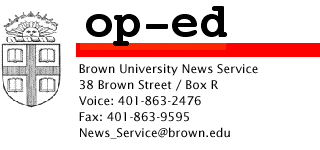

|
Distributed September 24, 2001 Copyright ©2001 by Neta Crawford |
Op-Ed Editor: Mark Nickel About 640 Words | |
|
Neta Crawford The pernicious effects of fear: Why we must have greater deliberation None of us will ever feel calmly about what happened on September 11, 2001, and what may happen in the future. We cannot expect a young administration to form a coherent policy to meet an enormous challenge in just a few days or weeks. But we must demand greater deliberation. And for that we need time. Things are moving very fast in Washington. Perhaps too fast. The rhetoric of officials rapidly vacillates between calm determination and harsh calls for revenge and war against those who perpetrated the attacks against New York and Washington. Our government has told us to prepare for a long war against terrorism, the warships have left the harbor, and the Congress has acted swiftly to pass relevant legislation. Yet the magnitude of the crime, the great stakes involved, and the fact that previous anti-terrorist strategies failed to prevent these attacks ought to give our leaders pause. Why does Washington find it so hard to slow down? First, leaders optimistically assume that they are immune from the pernicious effects of fear on foreign policy decision making. But this is assumption is dangerous. Every foreign policy decision maker in Washington is operating under tremendous stress. Many in the capital, including members of Congress who are considering drafting a war powers resolution, had to abandon their offices yet again under fear of a bomb attack. The President and all the members of the National Security staff have had their lives threatened. The secretary of defense and all the joint chiefs were assaulted. It is no wonder that now members of Congress and the military are talking of broad and sustained military assaults, or perhaps even for a war against the entire country of Afghanistan. Government officials are brave to walk into buildings that they know or have good reason to suspect were and may still be targets of terrorist attack. Immediately following the attacks on the United States, U.N. Secretary General Kofi Annan said, “In such moments cool and reasoned judgments are more essential than ever.” But under these conditions we cannot expect cool judgments from the political and military leadership. Instead, as research in psychology and foreign policy decision making shows, the President and Congress may take rash steps that they come to regret as they try to operate in such a tense environment. Fearful and angry actors tend to function less well in conditions like those faced in Washington this week. The effects of fear are physiological and cognitive. Specifically, fearful actors focus on threats – even seeing them when they aren’t there. The fearful also tend to reach for aggressive solutions and screen out information and arguments that suggest those solutions might be ineffective or perhaps even counterproductive over the long run. Fearful actors also often place great emphasis on short-term consequences of actions, while de-emphasizing the long term. Massive retaliation feels right now; will it be right in six months or a few years? In sum, those who had their lives threatened or were directly attacked just a few days ago must fight the (understandable) physiological and cognitive effects of fear. The administration emphasizes its “quiet anger” and its resolve for justice. But this is not the time to rush into granting broad war powers to the President, or for developing a policy of massive retaliation against terrorists. We must instead gather information, rescue those who may still be at risk, protect ourselves from immediate harm, and develop a long term strategy for dealing with terrorism. A sweeping and massive military response may only fuel the cycle of violence and stiffen the resolve of the terrorists to strike back. Official Washington also rushes to act because it assumes all of us want immediate relief. But the President and Congress should not assume that the American people necessarily want massive retaliation. Instead, we would rather that the solution devised be effective. We cannot expect a young administration to form a coherent policy to an enormous challenge in just a few days or weeks. None of us will ever feel calmly about what happened on Tuesday and what may happen in the future. But we must demand greater deliberation. And for that we need time. Neta Crawford is a visiting associate professor (research) at the Thomas J. Watson Jr. Institute for International Studies at Brown University and assistant professor of political science at the University of Massachusetts–Amherst. ###### | ||